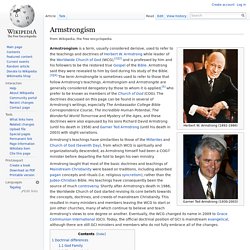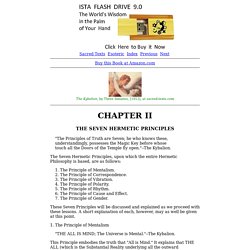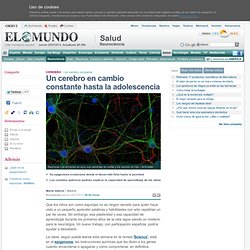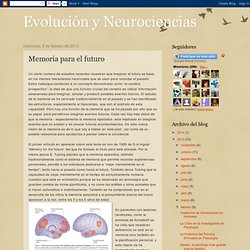

Architecture of the Universe. Meher Baba: The Truth Of The Unity Of All Life. Armstrongism. Armstrongism is a term, usually considered derisive, used to refer to the teachings and doctrines of Herbert W.

Armstrong while leader of the Worldwide Church of God (WCG),[1][2] and is professed by him and his followers to be the restored true Gospel of the Bible. Armstrong said they were revealed to him by God during his study of the Bible.[3][4] The term Armstrongite is sometimes used to refer to those that follow Armstrong's teachings. Armstrongism and Armstrongite are generally considered derogatory by those to whom it is applied,[5] who prefer to be known as members of the Church of God (COG). Armstrong taught that most of the basic doctrines and teachings of Mainstream Christianity were based on traditions, including absorbed pagan concepts and rituals (i.e. religious syncretism), rather than the Judeo-Christian Bible.
His teachings have consequently been the source of much controversy. Doctrinal differences[edit] God Family[edit] Church authority[edit] British Israelism[edit] The Kybalion: Chapter II. The Seven Hermetic Principles. Sacred Texts Esoteric Index Previous Next Buy this Book at Amazon.com The Kybalion, by Three Initiates, [1912], at sacred-texts.com.

Art techniques.
Un cerebro en cambio constante hasta la adolescencia. Que los niños son como esponjas no es ningún secreto para quien haya visto a un pequeño aprender palabras y habilidades con sólo repetirlas un par de veces.

Sin embargo, esa plasticidad y esa capacidad de aprendizaje durante los primeros años de la vida sigue siendo un misterio para la neurología. Un nuevo trabajo, con participación española, podría ayudar a desvelarlo. La clave, según puede leerse esta semana en la revista 'Science', está en el epigenoma, las instrucciones químicas que les dicen a los genes cuándo encenderse o apagarse y cómo comportarse, en definitiva.
BCNeurociencia : "Haikus, origami y neurociencia"... Neurociencias. Memoria para el futuro. Un cierto número de estudios recientes muestran que imaginar el futuro se basa en los mismos mecanismos neuronales que se usan para recordar el pasado.

Estos hallazgos conducen a un concepto denominado como “el cerebro prospectivo”: la idea de que una función crucial del cerebro es utilizar información almacenada para imaginar, simular y predecir posibles eventos futuros. El estudio de la memoria se ha centrado tradicionalmente en el pasado y se han identificado las estructuras, especialmente el hipocampo, que son el sustrato de esta capacidad.
Pero hay una función de la memoria que se ha pasado por alto que es su papel para permitirnos imaginar eventos futuros. Cada vez hay más datos de que la memoria - especialmente la memoria episódica- está implicada en imaginar eventos que no existen y en simular futuros acontecimientos. De esta nueva visión de la memoria es de lo que voy a hablar en este post , así como de su posible relevancia para ayudarnos a pensar sobre la conciencia.
The World Peace Plan. Getorganizednow.com. Pdpday. Email from Google. Free office and productivity software - Kaaredyret.dk. Sign In to get Your Personalized Recommendations. TED: Ideas worth spreading. The Right Brain vs Left Brain test. VS Ramachandran on your mind. Jill Bolte Taylor's stroke of insight. 2011 Chinese Calendar - Chinese Folk Art. HR Holden Specifications. Gumtree / Home.